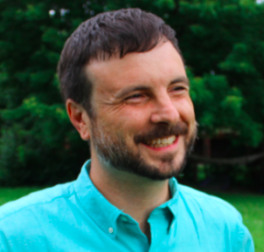Business Advisor, N Y Small Business Development Center at Onondaga Community College
1. What is your title/organization/job description?
I have been connected to the credit union community my whole life, initially as a passenger – my family having an account at Mon Marine Credit Union (currently merged and operating as Frick Tri-Valley Credit Union) through my father’s employment on Monongahela Railroad, later my first professional job working for a state funded watersheds and riovers non-profit I became a member of the Pennsylvania State Employees Credit Union. When I moved to Syracuse and joined Cooperative Federal Credit Union I was amazed at how a financial institution could function for social justice. As I settled down in Syracuse I became more able to involve myself with the larger cooperatives movement that hadn’t been so easy to access in other places I lived from retail to housing to education.
Coordination and not competition. Working as a community to determine needs and then implementing ways to fill those needs that creates a dignified life for everyone and every thing.
The feeling of scarcity among everyone in society due to unequal resource allocation as well as lack of social security leads to the state of competition and accumulation that prevents more of a cooperative culture from being implemented faster.
This is one of the reasons we are working on the NYCN – to fill in gaps, identified by myself, and others on the team, but also by cooperative businesses in our working areas. The goal is to continually expand the solidarity economy ecosystem to the point where it is possible to fill all gaps with employee ownership companies.
We’re a small family as of yet, comparatively. Our work is to dispel the boot strap and superman myths. We do that immensely by helping other cooperatives and being blatant about it.
Youth can and should be involved in every aspect of the solidarity economy ecosystem and movement. It’s just a matter of, like with any other endeavor, identifying their specific needs, interests, and the resources to support their involvement. One example is the youth credit union branches that Cooperative Federal Credit Union has developed in three local Syracuse high schools. Another example is that I’ve always wanted to work with various social service providers in my neighborhood to develop a youth cooperative lemonade stand in the summers. The idea has received positive feedback, but I haven’t yet found time to kick-start it.
It is local. 99.9% of us will have the most ability, to make the most change, at the local level. Focus your work there.
Democracy Now! Syracuse Post-Standard. Grassroots Economic Organizing. Capital Pressroom, Capital Area’s Solidarity Notes, Syracuse Peace Council’s Peace Newsletter, Communities Magazine and the Federation of Intentional Communities, Permaculture Design Magazine. Crowdsourced articles through social media from New York Times, TruthDig, YES Magazine, Portside, In These Times, and others.
Our website at https://newyorkcooperativenetwork.wordpress.com/ ;and a Google Group which has been inactive but I hope to re-energize for network wide communications at https://groups.google.com/d/forum/newyorkcooperative
For SBDC related information and programs/services, check out www.onondagasbdc.org and http://www.nyssbdc.org/index.aspx


